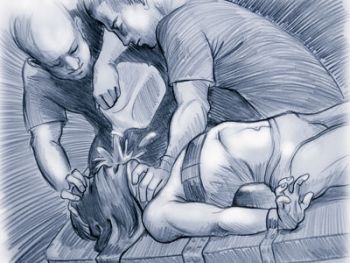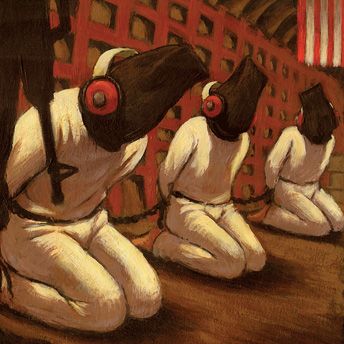
Publisher:
Bonnie King
CONTACT:
Newsroom@Salem-news.com
Advertising:
Adsales@Salem-news.com

~Truth~
~Justice~
~Peace~
TJP
Sep-05-2013 20:30

 TweetFollow @OregonNews
TweetFollow @OregonNews
Psychoanalysing Psychiatrists and Psychologists who Torture
Robert J. Burrowes Salem-News.comIt takes someone with a particular psychological profile to torture another human being: Most of us cannot do it. Clearly, any torturer falls readily into the category of someone with a 'violent personality'.
 linktv.org |
(TASMANIA, Aust.) - While the history of the involvement of psychiatrists and psychologists in torture programs for political purposes is, tragically, extensive (see, for example, 'Political Abuse of Psychiatry: An Historical Overview' http://www.ncbi.nlm.nih.gov/
Moreover, in a recent article, 'Hawaiian Mind Games: American Psychological Association Fiddles While Psychology Burns', https://www.transcend.org/tms/
In fact, in a response from the Coalition for an Ethical Psychology http://www.ethicalpsychology.
According to Eidelson and Soldz, the American Psychological Association (APA) has faced repeated calls for action to prevent further such abuses by members of the profession and to engage in a careful reconsideration of the ethics of the involvement of psychologists in torture, but to no avail.
Why does the leadership of the APA still endorse torture? And why do some psychiatrists and psychologists in countries around the world still participate in torture and other forms of violence against people who might reasonably expect considerate treatment from these 'health professionals'? Let us psychoanalyse the torturers.
It takes someone with a particular psychological profile to torture another human being: Most of us cannot do it. Clearly, any torturer falls readily into the category of someone with a 'violent personality'.
In essence, torturers and those who endorse torture are people who have suffered an extraordinary level of terror and violence during their own childhood and this leaves them particularly badly emotionally damaged. Interestingly, perhaps, this might be concealed behind a good-looking face and/or a superficially pleasant personality, which any psychiatrist or psychologist might have. Careful scrutiny and analysis, however, reveals that individuals who torture, whatever their professional background, share a number of feelings/attributes, most of which are invisible to casual observation. See 'Why Violence?' http://tinyurl.com/whyviolence Let me describe the general psychological profile of a torturer while acknowledging that each torturer is unique.
Fundamentally, perpetrators of torture are terrified and they are particularly terrified of those individuals who perpetrated violence against them when they were a child although this terror remains unconscious to them. Second, this terror is so extreme that torturers are too terrified to consciously identify to themselves their own perpetrator (one or both parents and/or other significant adults who are supposed to love them) and to say that it is this individual or individuals who are violent and wrong.
Third, because they are terrified, they are unable to defend themselves against the original perpetrator(s) but also, as a result, they are unable to defend themselves against other perpetrators who attack them later in life. This lack of capacity to defend themselves leads to the fourth and fifth attributes – a deep sense of powerlessness and a deep sense of self-hatred and this latter attribute, in turn, negates any sense of personal self-worth, leaving them with an extremely negative conception of themselves as 'bad', the sixth attribute. However, and this is vitally important, it is too terrifying and painful for the torturer to be consciously aware of any of these feelings/attributes: they remain deeply embedded within their unconscious and they are not necessarily apparent to others.
 Courtesy: technorati.com |
Seventh, the extreme social terrorisation experience to which torturers have been subjected means that the feelings of love, compassion, empathy and sympathy, as well as the mental function of conscience, are prevented from developing (or they are seriously underdeveloped and/or perhaps skewed so that they have sympathy for other perpetrators of violence). This is because the human potential to have a conscience and to have the feelings of love, compassion, empathy and sympathy depend on exposure to these and cultivation of them during childhood: they cannot be fully developed later. Devoid of conscience and these feelings, perpetrators of torture can inflict violence on others without experiencing the feedback that conscience, love, compassion, empathy and sympathy would provide.
Eighth, torturers have a delusional belief in the effectiveness and morality of violence; they have no capacity to perceive its dysfunctionality and immorality. Ninth, because they are terrified of identifying that they are the victim of the violence of their own parents (and/or other significant adults from their childhood) and that this violence terrified them, torturers unconsciously delude themselves about the identity of their own perpetrator. They will unconsciously identify their 'perpetrator' as one or more individuals of whom they are not actually afraid. And prisoners, including those suspected of 'terrorism', are 'legitimised victims' who are clearly not threatening (to them); moreover, they are also vulnerable.
Tenth, torturers unconsciously project their self-hatred, one outcome of their own victimhood, as hatred for their victim. This enables them to both self-justify their behaviour and to obscure from themselves their true but unconscious motivation: to remain unaware of their own terror, defencelessness, powerlessness, self-hatred, self-worthlessness, and all of the other unpleasant feelings that make them become individuals who torture.
Eleventh, torturers have an intense fear of knowing the truth: it is safer to believe that their carefully but unconsciously chosen victim, who is always much less powerful than the torturer, is 'the problem' (and thus gain the desired, but delusionary, sense of 'having control'). The truth would require them to stand up to the actual perpetrator and, of course, this is utterly terrifying.
It is partly because of this fear that torturers also have a twelfth attribute: they will unconsciously seek a legitimised way to inflict their violence. Why? Because they are trapped between two further and competing fears. On the one hand, they have a compulsion to inflict violence (on someone they now delusionarily project is their perpetrator) in 'self-defense' but, on the other hand, they have been terrorised into obedience, including obedience of laws which proscribe the use of violence. By working in the institutional setting, these individuals will be able to inflict their violence 'legally' in the form of torture.
Thirteenth, torturers lack the courage to heal; that is, they delude themselves that their own fear and terror are not responsible for their violence because they are too terrified to take responsibility for feeling this fear and terror as the central component of any strategy for dealing truthfully and powerfully with their violence.
Torturers, including those who are psychiatrists or psychologists, need our understanding and support: they are people who are badly emotionally damaged as a result of the torture/violence inflicted on them when they were children. But their violence, inflicted on behalf of their political masters, needs to be nonviolently resisted as well.
If you wish to join the worldwide movement to end all violence, including torture, you can sign online 'The People's Charter to Create a Nonviolent World' http://
Robert J. Burrowes
P.O. Box 68
Daylesford
Victoria 3460
Australia
Email: flametree@riseup.net
Websites: http://
http://tinyurl.com/flametree (Flame Tree Project)
http://tinyurl.com/whyviolence ('Why Violence?')
http://anitamckone.wordpress.
http://robertjburrowes.
 |
About Robert J. Burrowes
Robert Burrowes has a lifetime commitment to understanding and ending human violence. He has done extensive research since 1966 in an effort to understand why human beings are violent. He has been a nonviolent activist since 1981.
Robert is the author of 'Why Violence?' -
tinyurl.com/whyviolence
 |
 |
 |
Articles for September 4, 2013 | Articles for September 6, 2013
Salem-News.com:


googlec507860f6901db00.html


Terms of Service | Privacy Policy
All comments and messages are approved by people and self promotional links or unacceptable comments are denied.
Ralph E. Stone September 6, 2013 7:32 am (Pacific time)
See my article "Doctors Without Morals" (www.berkeleydailyplanet.com/issue/2010-07-13/article/35851?headline=News-Analysis-Doctors-without-Morals--By-Ralph-E.-Stone)
[Return to Top]©2026 Salem-News.com. All opinions expressed in this article are those of the author and do not necessarily reflect those of Salem-News.com.